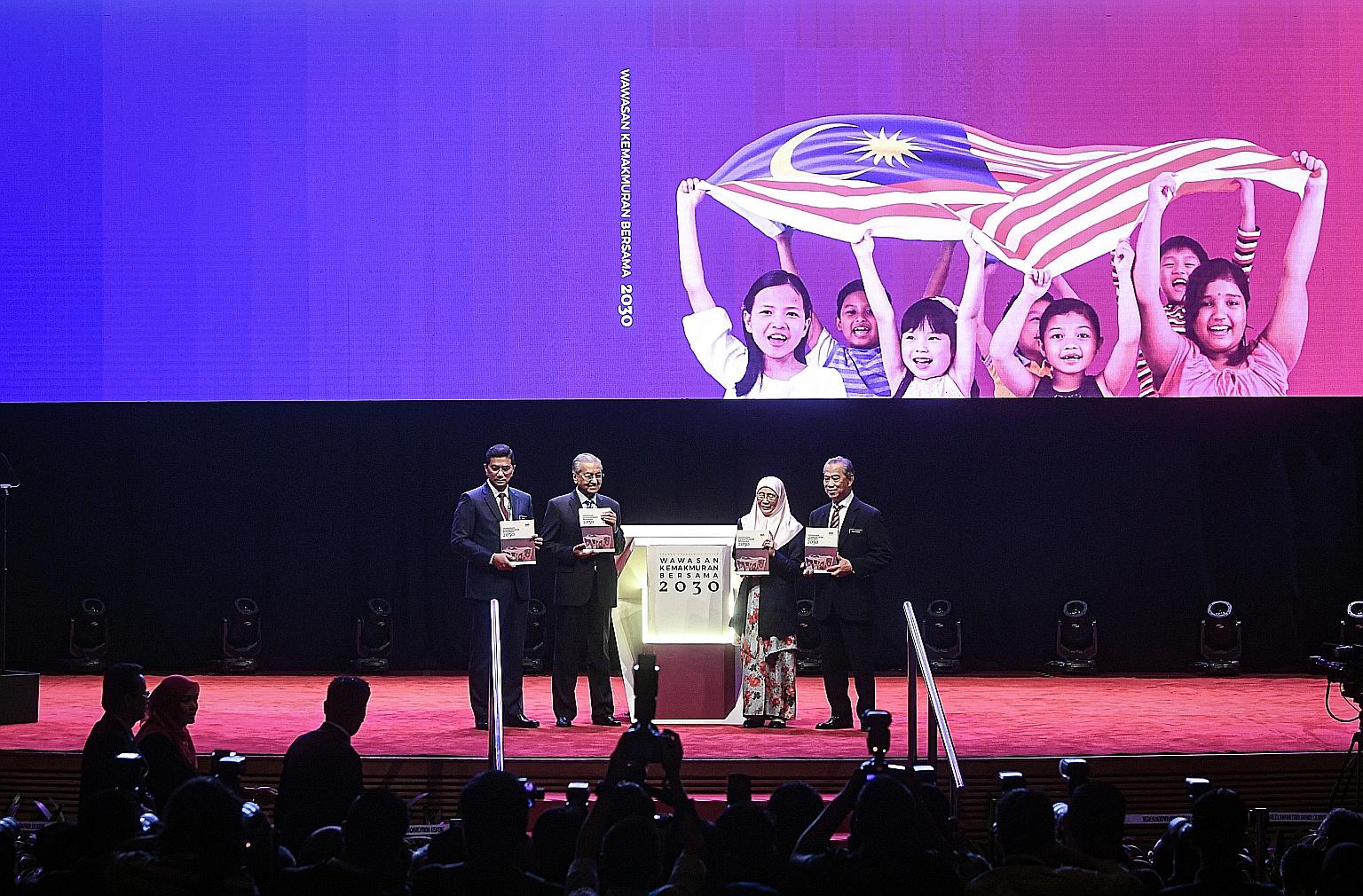Malaysian government aims to close inter-ethnic income gap to within 10% by 2030
Sign up now: Get ST's newsletters delivered to your inbox

Malaysian Prime Minister Mahathir Mohamad (second from left) at the launch of the Shared Prosperity Vision 2030 plan yesterday. With him are (from left) Economic Affairs Minister Azmin Ali, Deputy Prime Minister Wan Azizah Wan Ismail and Home Minister Muhyiddin Yassin.
PHOTO: BERNAMA
Follow topic:
KUALA LUMPUR - The Pakatan Harapan (PH) government wants to raise the earnings of the Bumiputera majority, slashing Malaysia's inter-ethnic income gap to within 10 per cent by 2030 by sending the economy up the value chain, according to its Shared Prosperity Vision (SPV).
Prime Minister Mahathir Mohamad launched the SPV on Saturday (Oct 5), claiming that Bumiputera - a community made up largely of Malay Muslims along with several indigenous tribes - have found their share of the pie reducing in recent years, especially compared to the economically dominant Chinese minority.
"The gap whether between Bumiputera or Indians to Chinese has expanded between 3.5 and four times in the past 27 years," he said, referring to their respective median household incomes.
He also revealed that between 2011 and 2015, when Najib Razak was in power, the Bumiputera corporate equity fell from 23.4 per cent to 16.2 per cent, while foreigners increased their holdings to 45.3 per cent from 37.2 per cent. Other Malaysians now have 30.7 per cent of corporate equity. Najib is now facing dozens of graft charges after being ousted last year.
"The 30 per cent Bumiputera equity target set in the New Economic Policy has yet to be achieved," he said, referring to the set of pro-Bumiputera policies introduced in 1970 after deadly race riots broke out the year before.
Economic Affairs Minister Azmin Ali acknowledged the need to "revisit some of the initiatives by the previous government to liberalise" the economy, which did away with ownership quotas especially in the financial sector.
"Maybe the timing was not correct. We don't know, so we have to study what was done," he told reporters.
The SPV replaces the Vision 2020 plan introduced by Tun Mahathir in 1991 during his 22-year reign, which he admitted will fall short of its target to turn Malaysia into a developed nation next year.
"Vision 2020 was not achieved because for the last 15 years, the wrong policies and strategies were implemented by the previous two administrations," he told a press conference, adding that high salaries and cash aid were used to boost incomes without increasing productivity.

"As such, many people remained poor as they became reliant on cash handouts and did not progress based on their own efforts," he said.
Dr Mahathir blamed the weaknesses and imbalances of Malaysia's economy on corruption, calling it a "cancer that must be cut off and removed".
The SPV claims that corruption and abuse of power stifled economic growth and distribution, with Bumiputera small and medium-sized enterprises (SMEs) contributing just 9 per cent to gross domestic product in 2015, despite more than half of RM1.1 trillion (S$362 billion) in government procurement handed to them in the preceding two decades.
It also calculated that the median Bumiputera and Indian households only earn 74 and 81 per cent of their Chinese counterparts.
The plan aims to see Bumiputera earn 90 per cent of what their countrymen make, increase the employee share of GDP from 36 to 48 per cent and ensure Bumiputera enterprises contribute 20 per cent to national income by 2030.
In comparison, the employee compensations in Singapore, South Korea and Germany are 39.7, 45.7 and 51.5 per cent of GDP respectively, according to the Organisation for Economic Cooperation and Development (OECD).
To achieve this, Malaysia says it needs to shed its reliance on commodities and low technology, with only 37 and 20 per cent of the manufacturing and services sector adopting high-end technology.
The launch came just three weeks after Umno and Parti Islam SeMalaysia (PAS) formed an opposition pact bringing together the country's two largest Malay Muslim parties.
They claim the PH government is sidelining the Malay majority. However, both parties are set to attend Sunday's Malay Dignity Congress that will be officiated by Dr Mahathir.
A top PH official told The Straits Times that "we rushed to launch SPV so that Tun can explain it to the congress".

